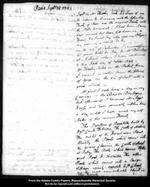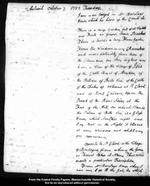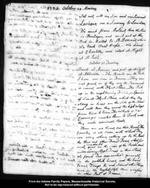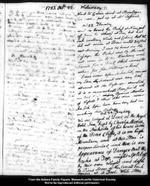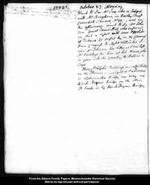PARIS SEPTR. 14 -- [6 OCTOBER] 1783
Septr. 14 Mr. Thaxter took his Leave of me to return to America, with the definitive Treaty of Peace and the original Treaty with the States General. -- I had been some days unwell, but soon fell down in a Fever. Sir James Jay, who was my Physician, gave me a vomit, &c. &c.
On the 22d of September, I removed from the grand Hotel du Roi, to Mr. Barclays at Auteuil, where I have continued to this Sixth day of October 1783.
Mr. Thaxter sailed in the Packet, from L'Orient, or rather from the Island of Groa [Groix], on the 26 of Septr. with a good Wind.
At first I rode twice a day in my Carriage, in the Bois de Boulogne but afterwards I borrowed Mr. Jays Horse, and have generally ridden twice a day, untill I have made my self Master of this curious Forest.
The Pavillon of Bagatelle, built by Mgsr. Comte D'Artois. The Castle of Madrid. The Outlet of the Forest near Pont Neuilly, the Porte which opens into the Grand Chemin, the Castle of Muet [La Muette] at Passy. The Porte which opens to the great Road to Versailles. The other Porte which opens into a large Village, nearly opposite to St. Cleod [Cloud], are the most remarkable Objects in this Forest.
AUTEUIL OCTOBER 7. 1783. TUESDAY.
I am now lodged in Mr. Barclays House, which he hires of the Comte de [Rouault].
There is a large Garden, full of all Vegetables and Fruits as Grapes, Pears, Peaches. There is besides a large Flower Garden.
From the Windows in my Chamber and more distinctly, from those of the Chambers, one Story higher, you have a View of the Village of Isis [Issy], of the Castle Royal of Muydon [Meudon], of the Pallace of Belle V e, of the Castle of the Duke of Orleans at St. Cleod and of Mont Calvare. Upon the Bank of the River Seine, at the Foot of the Hill, on which stands the Palace of Belle V e, is a Glass House, which smoakes night and Day. But in the Night, it blazes at every Window and exhibits a very gay appearance.
Opposite to St. Cleod, is the Village of Boulogne, from whence the Grove or Forest takes its Name. This Wood merits a particular Description.
From Mr. Barclays House, where I now am, I go to the Gate, by which
Page 3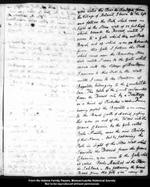
you enter the Bois de Boulogne, from the Village of Auteuil. I turn to the left and follow the Path, which runs in sight of the Stone Wall of 12 feet high which bounds the
Forrest,
untill I come to a Gate which they call Porte Royal, out of which you go to Versailles. From this Gate I follow the Path which runs near the Boundary Stone Wall,
untill I come to the Gate which opens into the Village of Boulogne. I pursue to this Path by the Wall
untill I come to the Pavillon of Bagatelle, belonging to the Comte D'Artois. The Estate of the Comte is
seperated from the Forest only by a Treillage or a kind of
Picketted Wooden Fence. Having passed the Bagatelle you come to the Royal Castle of Madrid, passing this you go out of the Wood into the Grand Chemin, by the Gate called Porte Neuilly, near the new Bridge of that Name. But by following the Path in Sight of the Stone Wall which seperates the
Forrest from the Grand Chemin, you come to the Gate, which is called Porte Maillot, at the Plain de Sablons. By following the Grand Road from this Gate, you come to
Page 4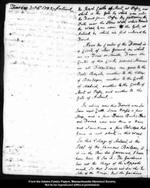
the Royal Castle of Muet, at Passy, near which is the Gate by which you enter the Forest from Passy. By following the Path near the Stone Wall, which bounds the Wood, You come to the Gate, at Auteuil, by which We first entered the Forest.
Near the Center of the Forest, is a Circle, of clear Ground, on which are no Trees or Shrubbs. From the Center of this Circle, proceed Avenues in all Directions. One goes to the Porte Royale, another to the Village of Boulogne, another to the Castle of Madrid, another to the Castle of Muet at Passy, and another to the Gate of Auteuil.
In riding over this Forrest, you see some neat Cattle, some Horses, a few Sheep, and a few Deers, Bucks, Does and Fawns, now and then a Hare and sometimes a few Patridges. But Game is not plenty in this Wood.
In this Village of Auteuil, is the Seat of the famous Boileau. It is in the Rue des Garrennes. I have been twice to see it. The Gardener has not the Keys of the
Appartements, so that I could not see the Inside of the House: But the
Gardiner
Page 5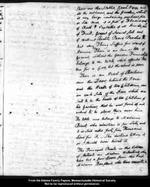
shew me the Stables, Coach House, and all the Outhouses, and the Garden, which is very large, containing perhaps five or six Acres. It is full of Flowers and of Roots and Vegetables of all Kinds, and of Fruits. Grapes of several sorts and of excellent Quality. Pears, Peaches &c. But every Thing suffers for want of Manure. There is an Acre or two of Ground, without the Garden Fence which belongs to the Estate, which affords Pasture for a Cow, but the Land is poor.
There is an Head of Boileau over the Door, behind the House, and the Heads of two Children, one on each Side of the Door, which are said to be the heads of two Children of his Gardiner, that he was fond of, and ordered to be placed there near him.
The Estate now belongs to Madame Binet, who advertises it for Sale, and it is said asks forty five Thousand Livres for it. She declines letting it, or I should have hired it.
The Principal People in this Village of Auteuil, are Madam Helvetius, who lives but a few Doors from this House, Madame Boufleurs, who lives opposite, &c.
1783. OCTOBER 20. MONDAY.
Set out with my Son and one Servant, Leveque, on a journey to London. We went from Auteuil, thro the Bois de Boulogne, and went out at the Port de Maillot to St. Dennis, where We took Post Horses. We dined at Chantilly, and lodged at Night at St. Just.
OCTOBER 21. TUESDAY.
Dined at Amiens, and put up, at night, at Abbeville. The Roads are the best I have ever seen in France. They are not paved, or if they are, the Pavement is covered, with Flynt Stones. They Pick up in the neighbouring Fields, a Species of small Flynt Stones, which they lay along in heaps on the Side of the Road, and with these they mend the high Ways from time to time. The Wheels of the Carriages crushes them to Dust, and they made admirable Roads.
There are no Vines, on this Road. The Country is all sown with Wheat. They are every where, cutting up by the Roots the Elms and other Forest Trees, which formerly grew were planted on the Sides of the Roads and introducing Apple Trees in their stead. We found Tea Apparatus's generally in the publick houses, and the hand Irons, Tongs &c. and several other Things more in the English Style than you find in other Parts of France.
1783. OCTR. 22. WEDNESDAY.
Went to Calais. Dined at Boulogne Sur mer. Put up at Mr. Dessins.
OCT. 23. THURSDAY.
Went on board the Packet at Nine, put off from the wharf at Ten, but had such contrary Winds and Calms, that We did not arrive at Dover untill 3 O'Clock next Morning. I was 18 hours on the Passage. The Packet was 17. She could not come in to the Harbour, made Signals for a Boat, which carried Us ashore for five shillings a head.
I was never before so Sea sick, nor was my Son. My Servant was very bad. Allmost all the Passengers were sick. It is a remarkable Place for it. We are told that many Persons Masters of Vessells and others who were never Sea sick before have been very bad in making this Passage.
OCT. 24. FRIDAY.
We are lodged at Dover, at the Royal Hotel Inn, kept by Charles Mariee. On the Backside of his house is one of the Dover Cliffs; it is an high Mountain, and at this Place is perpendicular, and there is an Appearance of Danger that the Rocks at Top, might split off by their own Weight, and dash to Pieces some of the small brick Houses at its Foot. -- White Stone.
Page 8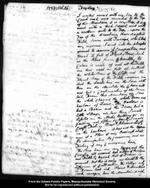
I walked round with my Son to the Coach road, and ascended to the Top of this Mountain. It is very steep. It is covered with a thick Sward, and with a Verdure quite to the Top. Upon the Top of the Mountain, there is a plowed Field, sown with Turnips, which look very vigorous. I went into the ploughed ground to examine its Composition, and found it full of Flynt Stones, such as the Road from Chantilly to Calais is made of, and all the Fields on that road are full of. In short the White Stone of the Cliffs, and the Flynt Stone of the Fields, convince me that the Lands here are the same with those on the other Side of the Channell and but a Continuation of the same Soil. From this Mountain, We saw the whole Channel, the whole Town and harbour of Dover. The Harbour is but a Basin and the Town, but a little Village. We saw three small Vessells on the Stocks, building or repairing, and fifteen or twenty small Craft, Fishing Sloops and schooners chiefly in the harbour. It has not the Appearance of a Place of any Business at all. No Manufacture, No Commerce, and no Fishery of any Consequence, here.
The Sheep here are very large, and the Country all around has a Face of Verdure and Fertility beyond that of France in general: but this is owing no doubt to the difference of Cultivation. The Valleys only in France look rich, Plains and Mountains look meagre. Here the Mountain is rich.
Page 9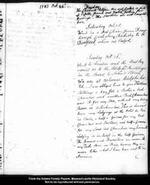
The Channell between this and Calais, is full of Vessells, french and English, fishing for Herrings. The Sardine are not caught here.
SATURDAY OCT. 25.
Went in a Post Chaise, from Dover through Canterbury, Rochester, &c. to Dartford, where We lodged.
SUNDAY OCTR. 26.
Went to London and the Post Boy carried Us to the Adelphi Buildings in the Strand, to John's Street.
We are at Osbornes Adelphi hotel. I am obliged here to give Thirteen Shillings a day, for a Parler, a bed Chamber, and another Bed Chamber over it for my Son, without any dining Room or Antichamber. This is dearer than my Lodgings at the Hotel du Roi in Paris -- half a Guinea for my bed Chamber and Parlour, and half a Crown for my Sons bed Chamber. My Servants Lodging is included in the half Guinea. The Rooms and Furniture are more to my Taste than in Paris, because they are more like what I have been used to in America.
1783. OCTOBER 27. MONDAY.
Went to see Mr. Jay who is lodged with Mr. Bingham, in Harley Street, Cavendish Square, No. 30. And in the Afternoon went to see Mr. Johnson, Great Tower Hill, who informed me that a Vessell with 1000 Hogsheads of Tobacco is passed by, in the Channel, from Congress to Messrs. Willinks. I gave Mr. Johnson his Letter, as I had left Mr. Hartleys for him at his House, who is gone into the Country, to Bath as he says.
These Adelphi Buildings are well situated on the Thames. In sight of the Terrace is Westminster Bridge one Way, and Black Fryars Bride on the other. St. Pauls is by Black Fryars Bridge.

